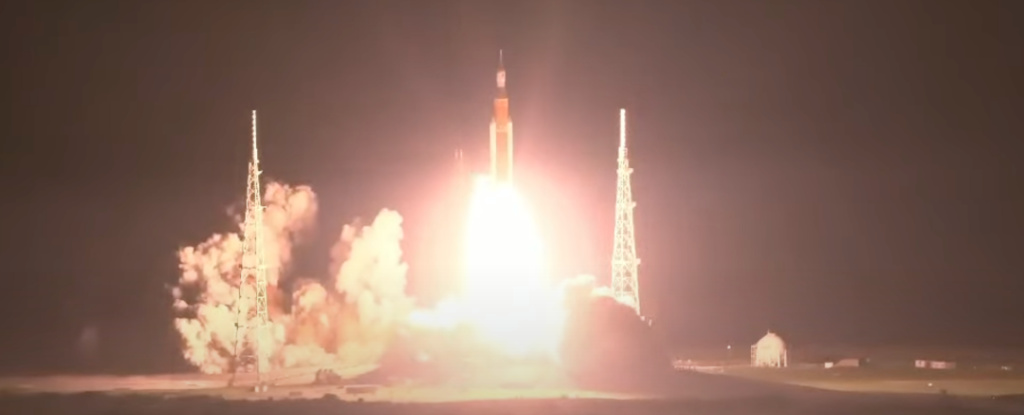Products You May Like
After two failed attempts, NASA has successfully launched its Moon-bound megarocket the Space Launch System, which will travel beyond the far side of the Moon and back – further than any other habitable spacecraft so far.
The Artemis 1 mission is the first step in NASA’s plan to return to the Moon for the first time in 50 years, and eventually travel to Mars in the 2030s.
We are going.
For the first time, the @NASA_SLS rocket and @NASA_Orion fly together. #Artemis I begins a new chapter in human lunar exploration. pic.twitter.com/vmC64Qgft9
— NASA (@NASA) November 16, 2022
The rocket launched at 0648 UTC Wednesday 16 November 2022 from NASA’s Kennedy Space Center in Florida.
By 0657 UTC NASA announced that the SLS rocket had reached main engine cutoff in the mission timeline. The RS-25 engines powered off and the core stage had separated.
The next step is for the solar arrays to be deployed so that the rocket can be powered by the Sun.
The test flight is uncrewed and will travel 64,000 km (40,000 miles) beyond the far side of the Moon.
The mission will last 25 days, 11 hours and 36 minutes. The Space Launch System (SLS) will splashdown back to Earth on 11 December 2022 after travelling a total distance of 2.09 million km (1.3 million miles).
This is the first in a series of increasingly complex missions designed to take humans back to the Moon for the first time since December 1972.
The new SLS being used is the most powerful rocket NASA has ever launched, and it’ll not only travel to the Moon – further than any spacecraft built for humans has ever flown – but also deploy some small satellites.
On board the Orion Crew Capsule there’ll be a slightly strange mix of mannequins, artifacts, mementos, and zero-gravity indicators.
The goal is to practice operating the spacecraft and test the crew conditions to make sure that the spacecraft is safe for future crew.
In 2024, NASA plans to launch Artemis 2, the first crewed Artemis mission into space using an even more powerful version of the Space Launch System rocket (assuming the spacesuits are ready).
Artemis 3 is scheduled for 2025, and will aim to land the first woman and first person of color to near the Moon’s south pole.
In 2027, the Artemis 4 mission will take astronauts to a mini-lunar station called Gateway.
